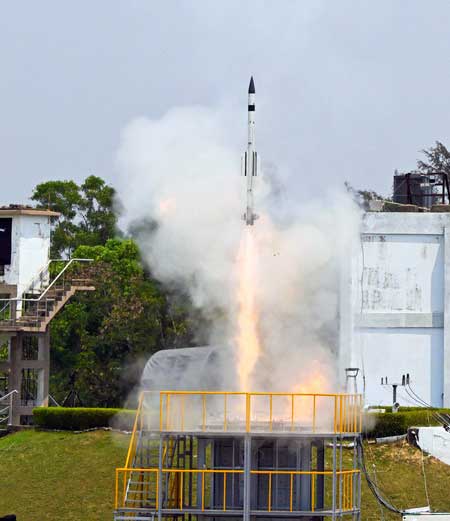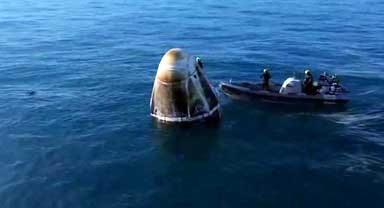India on Saturday successfully placed into orbit TeLEOS-2 and Lumilite-4 satellites both from Singapore.
With this latest rocketing success, the Indian Space Research Organisation (ISRO) has orbited 424 foreign satellites from 36 countries since 1999.
Speaking about the mission Indian Space Research Organisation (ISRO) Chairman S. Somanath said: "The PSLV rocket has placed the satellites at the intended orbit. The PSLV has demonstrated its higher reliability."
Adding further Somanath said the ISRO team has done several new things to bring down the rocket's cost as the industry is gearing up manufacture.
He said the rocket's upper stage on which seven non-separable payloads are fixed will be orbiting for a month and do the experiments.
"For the first time, a deployable solar panel has been fixed on the upper stage," Somanath added.
The PSLV Core Alone variant rocket carrying the 741 kg synthetic aperture radar satellite TeLEOS-2 as the primary passenger and the 16 kg Lumilite-4, a technology demonstration nano satellite as the co-passenger blasted off from the first launch pad at Satish Dhawan Space Centre (SDSC) here at 2.20 p.m.
The rocketing on Saturday was made possible by NewSpace India Ltd-the commercial arm of India's Department of Space -- by contracting with the two parties.
These two satellites apart, there are seven non-separable experimental payloads which are part of the rocket's final stage (PS4). They belong to ISRO, Indian Institute of Space Science and Technology (IIST), Bellatrix Aerospace, Dhruva Space, and Indian Institute of Astrophysics.
The ISRO uses the final stage (PS4) of the PSLV rocket as an orbital platform for in-orbit experiments and has named it as PSLV Orbital Experimental Module (POEM).
The four stage expendable, 44.4 m tall PSLV-C55 rocket weighing 228 ton slowly rose-up towards the skies from the first launchpad here with thick orange flame at its tail.
The rocket gained speed as it went up while emitting a rolling thunder sound.
The PSLV rocket is powered by solid (first and third stages) and liquid (second and fourth stages) fuels alternatively.
The PSLV in normal configuration is a four stage/engine expendable rocket powered by solid and liquid fuels alternatively with booster motors strapped on to the first stage to give higher thrust during the initial flight moments.
The rocket that flew on Saturday was the 57th flight of PSLV and 16th mission of the Core Alone variant, without any strap-on motors.
According to ISRO, The TeLEOS-2 satellite is developed under a partnership between DSTA (representing the government of Singapore) and ST Engineering.
Once deployed and operational, it will be used to support the satellite imagery requirements of various agencies within the government of Singapore.
The TeLEOS-2 carries a synthetic aperture radar payload. TeLEOS-2 will be able to provide all-weather day and night coverage, and is capable of imaging at 1m full-polarimetric resolution, ISRO said.
The Lumelite-4 satellite is co-developed by the Institute for Infocomm Research (I2R) of A*STAR and Satellite Technology and Research Centre (STAR) of the National University of Singapore.
The Indian space agency said Lumilite-4 is an advanced 12U satellite developed for the technological demonstration of the High-Performance Space-borne VHF Data Exchange System (VDES).
Using the VDES communication payload developed by I2R and STAR's scalable satellite bus platform, it aims to augment Singapore's e-navigation maritime safety and benefit the global shipping community.
Just over 19 minutes into its flight, the PSLV-C55 first orbited TeLEOS-2 and followed it by Lumilite-4 - both into an Eastward low inclination orbit.






NPCI to decide on person-to-merchant payments cap on UPI transactions: RBI
In order to further boost digital payments, the National Payments Corporation of India will be enabled to set the limit on person-to-merchants transactions via Unified Payments Interface (UPI), RBI Governor Sanjay Malhotra said on Wednesday.
New AI algorithm to predict risk of cardiovascular events, heart-related death
A team of researchers in South Korea has developed a novel artificial intelligence (AI)-based algorithm that uses electrocardiograph (ECG)2 data to predict the risk of cardiovascular events, and heart-related death.
India successfully flight-tests indigenously-developed vertically-launched Surface-to-Air Missile
In a boost to India's precision firepower, the Defence Research & Development Organisation (DRDO) and the Indian Navy conducted the successful flight-test of indigenously-developed Vertically-Launched Short-Range Surface-to-Air Missile (VLSRSAM) on Wednesday, an official statement said.
Unplanned welcome: Dolphins greet astronauts as they return home after extended space mission
Astronauts Sunita Williams and Butch Wilmore, along with NASA’s Nick Hague and Russian cosmonaut Aleksandr Gorbunov, have returned to Earth after a lengthy journey that turned a planned eight-day mission into a nine-month in space.
Stranded US astronauts return to Earth, after nine months in space
The SpaceX Dragon spacecraft carrying them and two other astronauts—Nick Hague and Russian cosmonaut Aleksandr Gorbunov—splashed down into the waters off the coast of Florida state just minutes before 6 p.m., as NASA had announced.
Google to acquire cloud security platform Wiz for $32 billion
Tech major Google on Tuesday announced to acquire Wiz, a leading cloud security platform headquartered in New York, for $32 billion in an all-cash transaction.
Ahead of Sunita William’s ‘homecoming’, PM Modi pens letter to India’s illustrious daughter
As the NASA astronauts Sunita Williams and Butch Wilmore begin their journey back home from space, after staying ‘stranded’ at the International Space Station (ISS) for about nine months, Prime Minister Narendra Modi has written a letter to one of India’s most illustrious daughters hoping for her safe return.
Sunita Williams set to return to Earth tomorrow
With the pair of US astronauts stranded for more than nine months on the International Space Station (ISS), the National Aeronautics and Space Administration (NASA) has confirmed that the duo will return to Earth on Tuesday evening.